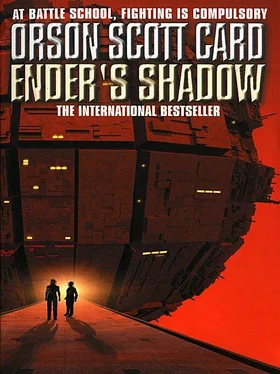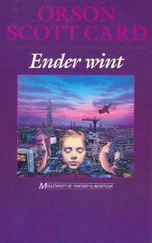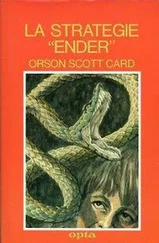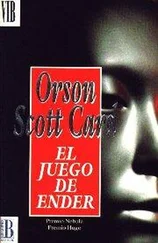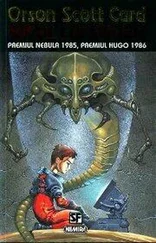Orson Card - Ender's Shadow
Здесь есть возможность читать онлайн «Orson Card - Ender's Shadow» весь текст электронной книги совершенно бесплатно (целиком полную версию без сокращений). В некоторых случаях можно слушать аудио, скачать через торрент в формате fb2 и присутствует краткое содержание. Жанр: Фантастика и фэнтези, на английском языке. Описание произведения, (предисловие) а так же отзывы посетителей доступны на портале библиотеки ЛибКат.
- Название:Ender's Shadow
- Автор:
- Жанр:
- Год:неизвестен
- ISBN:нет данных
- Рейтинг книги:4 / 5. Голосов: 1
-
Избранное:Добавить в избранное
- Отзывы:
-
Ваша оценка:
- 80
- 1
- 2
- 3
- 4
- 5
Ender's Shadow: краткое содержание, описание и аннотация
Предлагаем к чтению аннотацию, описание, краткое содержание или предисловие (зависит от того, что написал сам автор книги «Ender's Shadow»). Если вы не нашли необходимую информацию о книге — напишите в комментариях, мы постараемся отыскать её.
Ender's Shadow — читать онлайн бесплатно полную книгу (весь текст) целиком
Ниже представлен текст книги, разбитый по страницам. Система сохранения места последней прочитанной страницы, позволяет с удобством читать онлайн бесплатно книгу «Ender's Shadow», без необходимости каждый раз заново искать на чём Вы остановились. Поставьте закладку, и сможете в любой момент перейти на страницу, на которой закончили чтение.
Интервал:
Закладка:
They were taken to their barracks, given beds, lockers, little portable desks that were much more sophisticated than the one he had used when studying with Sister Carlotta. Some of the kids immediately began to play with them, trying to program them or exploring the games built into them, but Bean had no interest in that. The computer system of Battle School was not a person; mastering it might be helpful in the long run, but for today it was irrelevant. What Bean needed to find out was all outside the launchy barracks.
Which is where, soon enough, they went. They arrived in the "morning" according to space time -- which, to the annoyance of many in Europe and Asia, meant Florida time, since the earliest stations had been controlled from there. For the kids, having launched from Europe, it was late afternoon, and that meant they would have a serious time-lag problem. Dimak explained that the cure for this was to get vigorous physical exercise and then take a short nap -- no more than three hours -- in the early afternoon, following which they would again have plenty of physical exercise so they could fall asleep that night at the regular bedtime for students.
They piled out to form a line in the corridor. "Green Brown Green," said Dimak, and showed them how those lines on the corridor walls would always lead them back to their barracks. Bean found himself jostled out of line several times, and ended up right at the back. He didn't care -- mere jostling drew no blood and left no bruise, and last in line was the best place from which to observe.
Other kids passed them in the corridor, sometimes individuals, sometimes pairs or trios, most with brightly-colored uniforms in many different designs. Once they passed an entire group dressed alike and wearing helmets and carrying extravagant sidearms, jogging along with an intensity of purpose that Bean found intriguing. They're a crew, he thought. And they're heading off for a fight.
They weren't too intense to notice the new kids walking along the corridor, looking up at them in awe. Immediately there were catcalls. "Launchies!" "Fresh meat!" "Who make coco in the hall and don't clean it up!" "They even smell stupid!" But it was all harmless banter, older kids asserting their supremacy. It meant nothing more than that. No real hostility. In fact it was almost affectionate. They remembered being launchies themselves.
Some of the launchies ahead of Bean in line were resentful and called back some vague, pathetic insults, which only caused more hooting and derision from the older kids. Bean had seen older, bigger kids who hated younger ones because they were competition for food, and drove them away, not caring if they caused the little ones to die. He had felt real blows, meant to hurt. He had seen cruelty, exploitation, molestation, murder. These other kids didn't know love when they saw it.
What Bean wanted to know was how that crew was organized, who led it, how he was chosen, what the crew was for . The fact that they had their own uniform meant that it had official status. So that meant that the adults were ultimately in control -- the opposite of the way crews were organized in Rotterdam, where adults tried to break them up, where newspapers wrote about them as criminal conspiracies instead of pathetic little leagues for survival.
That, really, was the key. Everything the children did here was shaped by adults. In Rotterdam, the adults were either hostile, unconcerned, or, like Helga with her charity kitchen, ultimately powerless. So the children could shape their own society without interference. Everything was based on survival -- on getting enough food without getting killed or injured or sick. Here, there were cooks and doctors, clothing and beds. Power wasn't about access to food-it was about getting the approval of adults.
That's what those uniforms meant. Adults chose them, and children wore them because adults somehow made it worth their while.
So the key to everything was understanding the teachers.
All this passed through Bean's mind, not so much verbally as with a clear and almost instantaneous understanding that within that crew there was no power at all, compared to the power of the teachers, before the uniformed catcallers reached him. When they saw Bean, so much smaller than any of the other kids, they broke out laughing, hooting, howling. "That one isn't big enough to be a turd!" "I can't believe he can walk!" "Did'ums wose um's mama?" "Is it even human?"
Bean tuned them out immediately. But he could feel the enjoyment of the kids ahead of him in line. They had been humiliated in the shuttle; now it was Bean's turn to be mocked. They loved it. And so did Bean-because it meant that he was seen as less of a rival. By diminishing him, the passing soldiers had made him just that much safer from ...
From what? What was the danger here?
For there would be danger. That he knew. There was always danger. And since the teachers had all the power, the danger would come from them. But Dimak had started things out by turning the other kids against him. So the children themselves were the weapons of choice. Bean had to get to know the other kids, not because they themselves were going to be his problem, but because their weaknesses, their desires could be used against him by the teachers. And, to protect himself, Bean would have to work to undercut their hold on the other children. The only safety here was to subvert the teachers' influence. And yet that was the greatest danger -- if he was caught doing it.
They palmed in on a wall-mounted pad, then slid down a pole -- the first time Bean had ever done it with a smooth shaft. In Rotterdam, all his sliding had been on rainspouts, signposts, and lightpoles. They ended up in a section of Battle School with higher gravity. Bean did not realize how light they must have been on the barracks level until he felt how heavy he was down in the gym.
"This is just a little heavier than Earth normal gravity," said Dimak. "You have to spend at least a half-hour a day here, or your bones start to dissolve. And you have to spend the time exercising, so you keep at peak endurance. And that's the key -- endurance exercise, not bulking up. You're too small for your bodies to endure that kind of training, and it fights you here. Stamina, that's what we want."
The words meant almost nothing to the kids, but soon the trainer had made it clear. Lots of running on treadmills, riding on cycles, stair-stepping, pushups, situps, chinups, backups, but no weights. Some weight equipment was there, but it was all for the use of teachers. "Your heartrate is monitored from the moment you enter here," said the trainer. "If you don't have your heartrate elevated within five minutes of arrival and you don't keep it elevated for the next twenty-five minutes, it goes on your record and I see it on my control board here."
"I get a report on it too," said Dimak. "And you go on the pig list for everyone to see you've been lazy."
Pig list. So that's the tool they used -- shaming them in front of the others. Stupid. As if Bean cared.
It was the monitoring board that Bean was interested in. How could they possibly monitor their heartrates and know what they were doing, automatically, from the moment they arrived? He almost asked the question, until he realized the only possible answer: The uniform. It was in the clothing. Some system of sensors. It probably told them a lot more than heartrate. For one thing, they could certainly track every kid wherever he was in the station, all the time. There must be hundreds and hundreds of kids here, and there would be computers reporting the whereabouts, the heartrates, and who could guess what other information about them. Was there a room somewhere with teachers watching every step they took?
Or maybe it wasn't the clothes. After all, they had to palm in before coming down here, presumably to identify themselves. So maybe there were special sensors in this room.
Читать дальшеИнтервал:
Закладка:
Похожие книги на «Ender's Shadow»
Представляем Вашему вниманию похожие книги на «Ender's Shadow» списком для выбора. Мы отобрали схожую по названию и смыслу литературу в надежде предоставить читателям больше вариантов отыскать новые, интересные, ещё непрочитанные произведения.
Обсуждение, отзывы о книге «Ender's Shadow» и просто собственные мнения читателей. Оставьте ваши комментарии, напишите, что Вы думаете о произведении, его смысле или главных героях. Укажите что конкретно понравилось, а что нет, и почему Вы так считаете.
